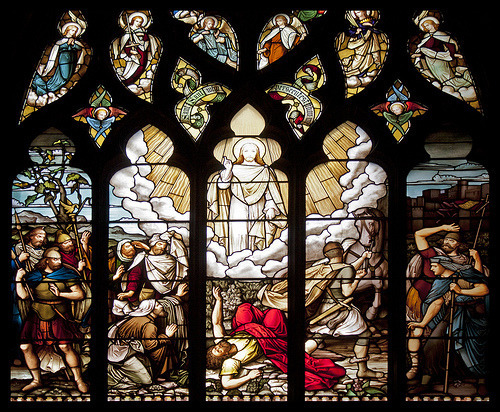
HOMILY for 23rd Mon per annum (I)
Col 1:24–2:3; Ps 61; Luke 6:6-11
“In my flesh I complete what is lacking in Christ’s afflictions” (Col 1:24). But St Paul is not saying here that the Passion of Jesus was somehow incomplete, nor by any means lacking in power to redeem humanity. Rather, St Paul is speaking about the mystery of the Church as the Body of Christ; a body that is always united to her head, Jesus Christ: the totus Christus, “whole Christ” as St Augustine would put it. And this mystery of the Church was first revealed to Paul when he first encountered the risen Lord on the Damascus road. “Saul, Saul, why do you persecute me?” (Acts 9:4).
Thus Paul learns that Jesus Christ is so close to his Church, so united in the communion of the Holy Spirit to his Church, that, as St Paul says to the Romans: “we, though many, are one body in Christ, and individually members one of another” (12:5). So, in the Church, we are all united with Christ, and through him, with one another too. We, who are members of the Body of Christ, are held together in the “grace of our Lord Jesus Christ, and the love of God, and the communion of the Holy Spirit”.
This communion between Christ and his Church is such that we each benefit from Christ’s sufferings; the Passion of Christ is redemptive. As Isaiah says: “by his wounds we are healed” (Isa 53:5). But we are not entirely passive in this work of redemption. For, the mystery of our communion with Christ is such that when Christians are suffering or persecuted – like St Paul was, or like so many of the sick and dying in our parishes and communities, for example – then, by God’s grace, they also participate and share in Christ’s redemptive suffering, taking up the cross of discipleship mentioned in yesterday’s Gospel (cf Lk 14:27). This is what St Paul means when he says that he, a persecuted and suffering Christian, a disciple who shares in Christ’s cross, completes “what is lacking in Christ’s afflictions for the sake of his body”. But this idea of redemptive suffering only makes sense because of who it is that St Paul encounters on the Damascus road: the Risen Christ. So, as the Second Vatican Council says: “Through Christ and in Christ, the riddles of sorrow and death grow meaningful. Apart from His Gospel, they overwhelm us” (Gaudium et spes, 22).
Our communion with one another in the Church is such that, as St Paul says to the Corinthians, “If one part suffers, every part suffers with it; if one part is honored, every part rejoices with it” (1 Cor 12:26). This is what Christian solidarity entails. Moreover, Vatican II taught that “the Holy Spirit in a manner known only to God offers to every man [who suffers] the possibility of being associated with [Christ’s] paschal mystery” (Gaudium et spes, 22). So, our solidarity is not just with other Christians but with all men and women of good will who suffer in our world.
Hence in these days we turn again to where St Paul first received this insight; to the Damascus road in Syria. There, the Body of Christ, our fellow men and women, are suffering greatly. So, let us continue to pray and work for peace in Syria and wherever there is violence, suffering, inhumanity, and injustice.
opalescentparrot liked this
lawrenceop posted this